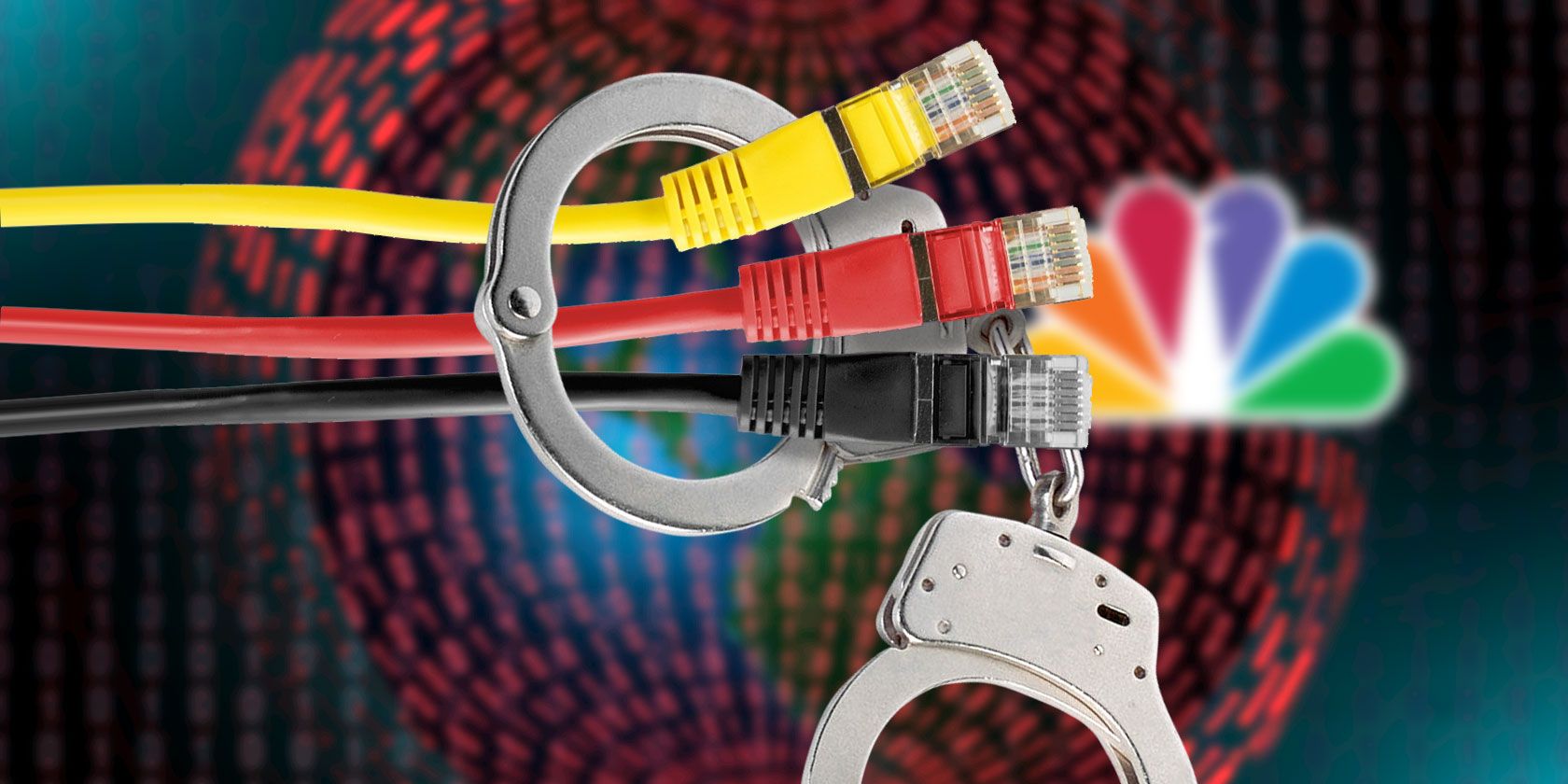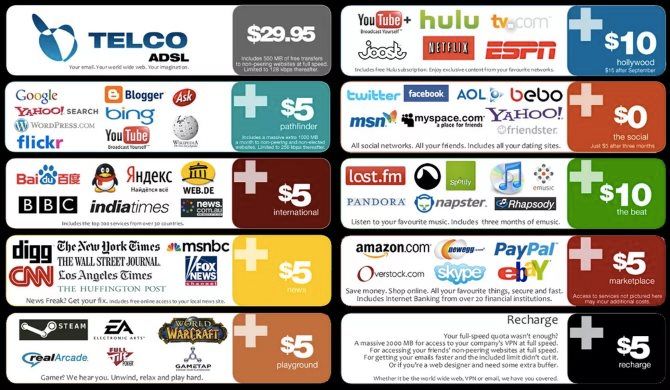Net neutrality, the principle that protects the free and open internet as we know it today, is under serious attack.
We'll get right to the point: net neutrality is not a partisan issue, and we don't care where you fall on the political spectrum. The repeal of net neutrality will affect you as an internet user. Here's what you need to know about this vital fight for the open web.
What Is Net Neutrality?
In case this is your first time hearing about net neutrality, let's quickly review what it means:
Net neutrality is the principle that internet service providers (ISPs) must treat all internet traffic equally, regardless of its content.
This is how the internet currently works. When you jump online, it doesn't matter if you visit MakeUseOf, Google, your friend's blog, or watch some videos on YouTube -- they all work the same way. Your ISP cannot check your network packets to see what sites you're visiting and decide to slow your browsing down because it doesn't like what you're doing.
Without net neutrality, ISPs could block content they didn't agree with, prioritize certain sites over others, and force websites to pay up for the privilege of being fast.
The Current United States Net Neutrality Law
In June 2015, the Federal Communications Commission (FCC) ruled in favor of net neutrality. It did so by reclassifying broadband as a "common carrier" under Title II of the Communications Act of 1934. Essentially, this places ISPs under regulation like airlines and phone companies are.
Until 2015, net neutrality was hotly debated among ISPs, their users, and the U.S. government. In the early days of the internet, ISPs provided internet access through dial-up service via phone companies' lines. Since phone companies were already bound to Title II, they couldn't mess with your connection. And back then, there were lots of ISPs in the game, like AOL, Earthlink, and NetZero. So if yours tried anything shady, you could simply switch to another provider.
Fast-forward to modern times, and high-speed connections are vital for streaming video, playing online video games, and more. Only a few major ISPs are in play now. Chances are that you subscribe to Comcast, Verizon, or Spectrum/Charter Communications for internet service. But the problem with that is...
ISPs Have Shown How They Feel About Net Neutrality
The reason that the FCC moved to reclassify broadband under Title II was due to ISPs abusing their power. FreePress has gathered a great sampling of offenses; among the worst:
- In 2005, Comcast blocked peer-to-peer networks like BitTorrent without telling its users.
- When the iPhone was new, AT&T forced Apple to block Skype on the iPhone unless users were on Wi-Fi. It didn't like that Skype provided a calling alternative to its services.
- From 2011-2013, when Google Wallet (now Android Pay) was new, AT&T, Sprint, and Verizon all blocked access to it. The reason? It competed with a similar app that they all had a stake in.
- In 2012, Verizon blocked people from using tethering apps. Tethering allows you to broadcast your phone's data connection as a Wi-Fi hotspot and connect other devices to it, like your laptop. Verizon didn't want users to be able to tether for free since it charged $20 for this at the time.
- Also in 2012, AT&T blocked its subscribers from using FaceTime on their iPhones unless they upgraded to a newer, more expensive plan. It had no reason for doing this other than to make more money.
All these instances would be illegal under current net neutrality rules. It's even arguable that mobile carriers have used data cap exemptions to get around net neutrality through a back door.
Do you see why net neutrality is so important? History is a good predictor of the future.
A Future Without Net Neutrality
It's not hard to take the above examples and expand on them to see what could happen to an internet without net neutrality. You've probably seen this image floating around, mocking up the "package deals" ISPs could offer without net neutrality in place:
While this is a bit far-fetched, think on a smaller scale. After all, ISPs love vague wording, and they won't dive all-in with their newfound power. They'll test the waters and see how far they can go, bit by bit.
For instance, Comcast owns NBC. It would rather you watch NBC shows on its streaming service than use Hulu or Netflix. Without net neutrality, what's to stop Comcast from slowing down access to Netflix, Hulu, YouTube, and similar and prioritize their own services?
They could hold Netflix hostage for millions of dollars to escape the "slow lane", resulting in Netflix having to pass that cost onto you. You're already paying for internet service and a Netflix subscription -- now you'll have to cover for Comcast's greed too.
Also consider the flow of information. Verizon owns HuffPost and Yahoo, via the subsidiary Oath. What happens if it doesn't want you to look at other news sites? Would you put up with absurdly slow speeds or outright blocking of news content that Verizon didn't agree with?
An Open Internet Is Essential
What makes the internet so special is that it's free and open to anyone. Think about people who earn their living, and companies who have created new methods of interaction, in ways that simply were not possible 20 or even 10 years ago:
- YouTube creating an alternative to traditional media and giving birth to stars like PewDiePie, Rhett & Link, and Phillip DeFranco. Even Justin Bieber got his start from being seen on YouTube.
- New ways of listening to and discovering music from Pandora, Spotify, and similar services.
- Online gaming bringing players from around the world together to play the latest games together.
- Subreddits on Reddit letting people interested in a common subject build a community.
- Allowing anyone to start a blog and voice their thoughts, sell their products to buyers worldwide, and a hundred other ways to participate online.
- The very website you're reading this article on!
All these people, services, and pages organically gained a following despite tons of competition online. What would happen to all the above if Comcast and friends had been able to filter out websites they didn't want you to access? What if they didn't like how your favorite YouTube channels posed a threat to their news, so they blocked them?
You're an entrepreneur and want to design a better alternative to a product that Verizon has a stake in? Too bad. Verizon will silence your potential threat to its income just like it blocked Google Wallet. How can we expect someone just starting out to build an audience and have success when they don't have the money to pay ISPs to get in the fast lane?
So when you see ads over the next few weeks from the ISPs with outright lies like this one, remember that actions speak far louder than words.
In fact, Comcast has already quietly dropped its statement about not allowing paid priority on its networks. They've spent hundreds of millions of dollars lobbying to repeal net neutrality, and you'd better believe that they intend to use it.
The FCC's Vote
On December 14th, the five FCC leaders will vote on whether to repeal net neutrality. The chairman, Ajit Pai, has spearheaded this campaign for repeal. What you might not know is that Pai was once a lawyer for Verizon. As we've established above, Verizon is licking its chops at the thought of net neutrality dissolving. He certainly doesn't have the interest of the public in mind, who vastly support keeping net neutrality.
If net neutrality goes away, the new proposed rules would only require ISPs to "be transparent about their practices so that consumers can buy the service plan that's best for them . . ." In other words, they'll bury all the new ways they're going to screw you over in the Terms and Conditions that nobody reads anyway.
Experts expect the repeal to pass with a 3-2 vote.
What Can You Do?
Your best action to keep net neutrality in place is contacting your elected officials. They (in theory) represent you, after all, so you need to let them know how you feel. The Electronic Frontier Foundation has created an easy-to-use tool that lets you send a letter to your members of Congress.
If you can call your representatives, governor, and other elected officials, do so. Let them know that you support keeping the internet free and open, and don't want to place its future in the hands of companies who are ready to abuse it. Visit BattleForTheNet for more info on how to get involved.
Politics Not Required
Before we summarize and close, it's worth mentioning why we don't think this is a political issue.
Some people think that net neutrality is something Democrats support and Republicans do not. Even though Barack Obama was in office when net neutrality was put into place, its roots exist farther back than that. While some might believe that classifying broadband as a Title II service wasn't the way to go about preserving net neutrality, that's not the argument here.
The classification does not give the government the right to meddle in the internet (the way that repealing net neutrality will give ISPs the ability to do just that). It allows the government to enforce regulations if ISPs act out of line. Conservatives and liberals alike should happily support about net neutrality. You can visit websites that cater to your views instead of being stuck with what your ISP wants you to see.
The Internet Is at Stake
Regardless, net neutrality is the current law, and right now it's facing a repeal. Repealing it would only benefit ISPs, not the consumer. Cable companies consistently rank as some of the most hated companies in America, yet people can't leave if they want internet access. This is because in many areas, one ISP has a monopoly.
You won't have another choice if Comcast starts forcing you to pay more for sites you want to visit. Everybody hates how cable companies make you pay an exorbitant amount of money for channels you don't care about, leading to many cutting out cable.
Why would you want that same problem with the internet?
If there's any question, companies that support net neutrality include Kickstarter, Twitter, Reddit, Mozilla, GitHub, DeviantArt, Discord, DuckDuckGo, Dropbox, Etsy, and OkCupid. Companies against it include Comcast, Verizon, and AT&T. Hmm...
In summary, we've seen what net neutrality protects and why these companies want to repeal it. In the past, they've acted to block apps and services from devices that you paid for because they don't want you to use them. This is ludicrous. If they'd block Skype to make more money, what's to stop them from blocking entire websites?
Removing net neutrality will allow ISPs to become gatekeepers that can control and manipulate what people access on the internet. That is absolutely terrifying.
Did this make it clear how important net neutrality is? How will you fight to keep the internet open? Tell us your thoughts and discuss in the comments, and make sure to share this article so everyone is informed!


